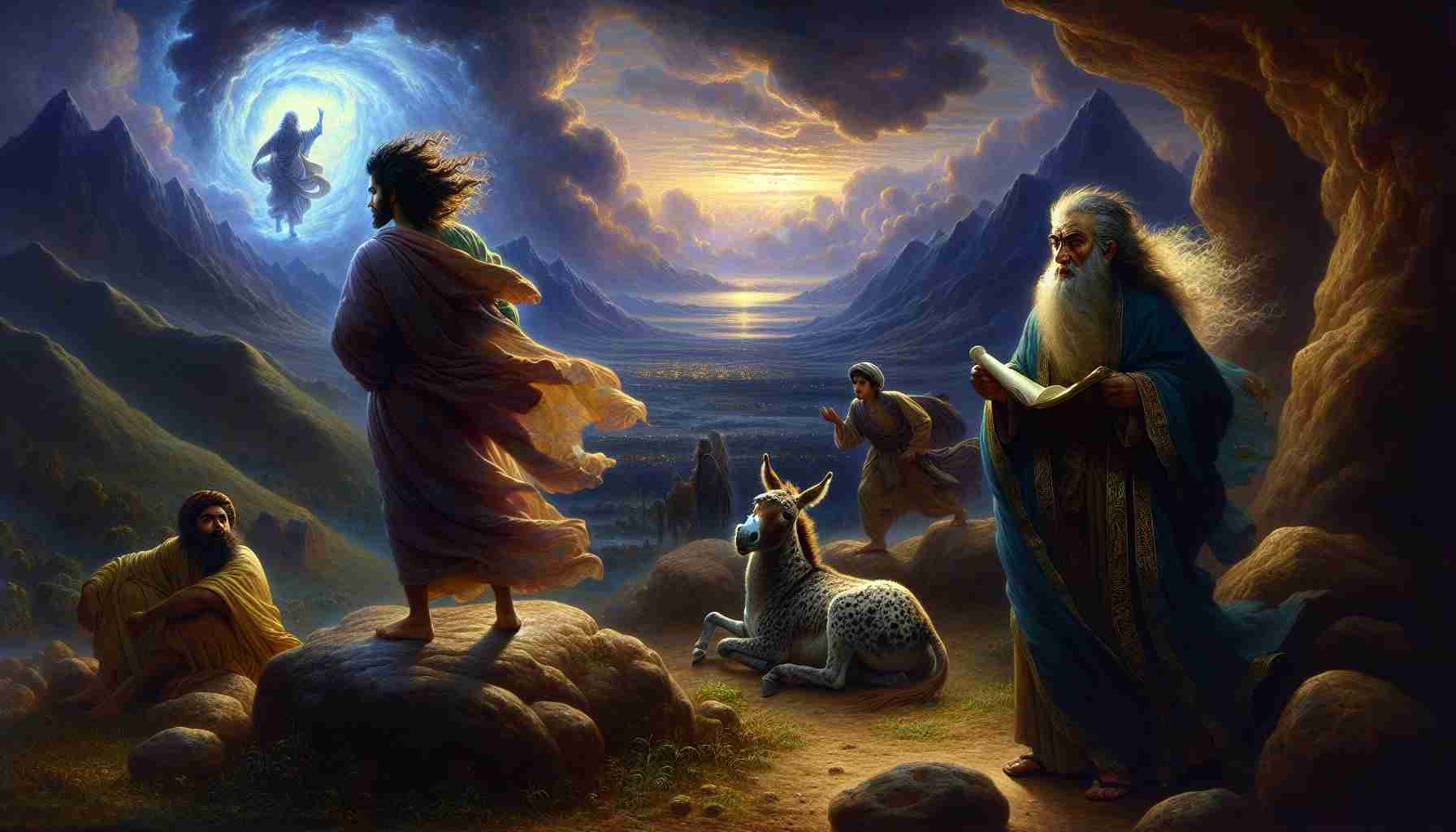

It wasn’t my job to speak. I led the donkey, kept the packs balanced, made the fire. I was just a servant—Bilam’s youngest—and never dared raise my voice unless spoken to. Until the day the donkey spoke first.
I had followed my master, Bilam the prophet, on many journeys. He was known far and wide, summoned by kings for blessings—or curses. This time, a Moabite king named Balak sent for him. He was frightened by Israel, the nation that had left Egypt and encamped near his borders. Balak thought if Bilam cursed them, his army would have a chance.
I didn’t understand much of the politics, but I understood fear. Balak was terrified. I saw it in his messengers' eyes when they came with gold and gifts.
Bilam refused twice. He said God had forbidden him, that these people were blessed. But then one morning, he came to me quickly, eyes wide, voice hurried.
“Pack the donkey. We ride to Moab.”
I said nothing, only obeyed. As we rode, something strange stirred in the air. My master’s movements grew tense. His face, usually so still, twitched with worry.
Suddenly, the donkey stopped. Then turned aside. Bilam struck him hard.
Again, he moved on. Again, the donkey left the path. My master hit him harder.
Then the donkey fell beneath him. Bilam roared and raised his staff again.
And then—I still feel the chill remembering it—the donkey spoke.
“Why are you hitting me?” it said.
My legs buckled. I thought I had gone mad.
Even crazier—my master answered her back as though this were normal.
“You made a fool of me!”
The donkey replied, “Have I ever done this to you before?”
“No,” he admitted.
Then I saw it—a brilliant figure ahead, sword drawn, burning like sunlight. It was an angel. Bilam dropped.
The angel told him plainly: “Your path is reckless. I would have struck you down, but your donkey saved you.”
Walking behind them, I felt something shift in me. If even a donkey knows to fear God, where did that leave me—a boy who had followed blindly?
The rest of the journey, Bilam was quiet.
At last we reached Moab. Balak stood on a high hill, waiting.
“Curse them,” he said, pointing to the Israelite camp stretched below.
Bilam raised his hands—but then his voice changed. I knew the tone. It wasn’t him speaking. It was God.
“How can I curse those God has not cursed?” he said. “From the tops of the mountains I see them—how beautiful are their tents, O Jacob.”
Balak was furious. He moved him to another spot. Again, Bilam tried. Again, blessings flowed.
I watched, stunned. The prophet who came to destroy, instead spoke words of light. In that moment, standing far behind, I understood: No human plan can bend the will of God. Not even kings and prophets.
And I, once voiceless, now believed my silence served a purpose.
I had seen truth spoken not by power, but by surrender.
It wasn’t my job to speak. I led the donkey, kept the packs balanced, made the fire. I was just a servant—Bilam’s youngest—and never dared raise my voice unless spoken to. Until the day the donkey spoke first.
I had followed my master, Bilam the prophet, on many journeys. He was known far and wide, summoned by kings for blessings—or curses. This time, a Moabite king named Balak sent for him. He was frightened by Israel, the nation that had left Egypt and encamped near his borders. Balak thought if Bilam cursed them, his army would have a chance.
I didn’t understand much of the politics, but I understood fear. Balak was terrified. I saw it in his messengers' eyes when they came with gold and gifts.
Bilam refused twice. He said God had forbidden him, that these people were blessed. But then one morning, he came to me quickly, eyes wide, voice hurried.
“Pack the donkey. We ride to Moab.”
I said nothing, only obeyed. As we rode, something strange stirred in the air. My master’s movements grew tense. His face, usually so still, twitched with worry.
Suddenly, the donkey stopped. Then turned aside. Bilam struck him hard.
Again, he moved on. Again, the donkey left the path. My master hit him harder.
Then the donkey fell beneath him. Bilam roared and raised his staff again.
And then—I still feel the chill remembering it—the donkey spoke.
“Why are you hitting me?” it said.
My legs buckled. I thought I had gone mad.
Even crazier—my master answered her back as though this were normal.
“You made a fool of me!”
The donkey replied, “Have I ever done this to you before?”
“No,” he admitted.
Then I saw it—a brilliant figure ahead, sword drawn, burning like sunlight. It was an angel. Bilam dropped.
The angel told him plainly: “Your path is reckless. I would have struck you down, but your donkey saved you.”
Walking behind them, I felt something shift in me. If even a donkey knows to fear God, where did that leave me—a boy who had followed blindly?
The rest of the journey, Bilam was quiet.
At last we reached Moab. Balak stood on a high hill, waiting.
“Curse them,” he said, pointing to the Israelite camp stretched below.
Bilam raised his hands—but then his voice changed. I knew the tone. It wasn’t him speaking. It was God.
“How can I curse those God has not cursed?” he said. “From the tops of the mountains I see them—how beautiful are their tents, O Jacob.”
Balak was furious. He moved him to another spot. Again, Bilam tried. Again, blessings flowed.
I watched, stunned. The prophet who came to destroy, instead spoke words of light. In that moment, standing far behind, I understood: No human plan can bend the will of God. Not even kings and prophets.
And I, once voiceless, now believed my silence served a purpose.
I had seen truth spoken not by power, but by surrender.